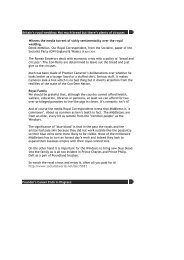New meanings of Panafricanism in the era of globalisation
New meanings of Panafricanism in the era of globalisation
New meanings of Panafricanism in the era of globalisation
You also want an ePaper? Increase the reach of your titles
YUMPU automatically turns print PDFs into web optimized ePapers that Google loves.
knowledge produc<strong>in</strong>g systems (see Hontoundji 2002) is a global question, not one that is<br />
peculiar to <strong>the</strong> African cont<strong>in</strong>ent. Odora Hoppers (2002:15-16) puts <strong>the</strong> matter most<br />
trenchantly:<br />
If development is endogenous … <strong>the</strong>n <strong>the</strong> people are <strong>the</strong> subject.<br />
They are not trapped <strong>in</strong> <strong>the</strong> cold condescend<strong>in</strong>g gaze <strong>of</strong> <strong>the</strong> rich<br />
upon <strong>the</strong> poor, because endogenous development beg<strong>in</strong>s at <strong>the</strong> po<strong>in</strong>t<br />
where people start to pride <strong>the</strong>mselves as worthy human be<strong>in</strong>gs<br />
<strong>in</strong>ferior to none: and where such pride is lost, development beg<strong>in</strong>s at<br />
<strong>the</strong> po<strong>in</strong>t at which this pride is restored, and history recovered.<br />
Yet <strong>the</strong> confluence between modern scientific knowledge, wealth<br />
and power cont<strong>in</strong>ues to privilege <strong>the</strong> exogenous model <strong>of</strong><br />
development … It cannot be said enough that rural people’s<br />
knowledge and modern scientific knowledge are complementary <strong>in</strong><br />
<strong>the</strong>ir strengths and weakness. Comb<strong>in</strong>ed, <strong>the</strong>y can achieve what<br />
nei<strong>the</strong>r would alone ….<br />
It is <strong>in</strong> <strong>the</strong> doma<strong>in</strong> <strong>of</strong> culture that some <strong>of</strong> <strong>the</strong> first and, <strong>in</strong>cidentally, <strong>the</strong> direction-f<strong>in</strong>d<strong>in</strong>g<br />
<strong>in</strong>itiatives will be engendered. It is <strong>the</strong> writers, poets, musicians, sculptors, architects, <strong>in</strong><br />
short, <strong>the</strong> artists <strong>of</strong> Africa, those whom Ngugi calls <strong>the</strong> “keepers <strong>of</strong> memory”, who need<br />
to serve as <strong>the</strong> bridge between an African past that is <strong>in</strong> every sense <strong>of</strong> <strong>the</strong> word<br />
<strong>in</strong>creas<strong>in</strong>gly acknowledged as “<strong>the</strong> cradle <strong>of</strong> civilisation” and a future that is at one and<br />
<strong>the</strong> same time <strong>in</strong>dubitably global as well as dist<strong>in</strong>ctively African. What is needed is no<br />
less than a fundamental shift <strong>in</strong> consciousness or <strong>in</strong> <strong>the</strong> habits <strong>of</strong> m<strong>in</strong>d <strong>of</strong> <strong>the</strong> peoples <strong>of</strong><br />
<strong>the</strong> cont<strong>in</strong>ent. Such a shift is only possible through <strong>the</strong> creations <strong>of</strong> art. In <strong>the</strong> best <strong>of</strong> all<br />
possible worlds, <strong>the</strong> artistic imag<strong>in</strong>ation forecasts <strong>the</strong> storms as well as <strong>the</strong> beautiful days<br />
that are yet to come. Innovative, parameters-shift<strong>in</strong>g work is be<strong>in</strong>g performed <strong>in</strong> doma<strong>in</strong>s<br />
such as music, dance, sculpture, lit<strong>era</strong>ture, applied language studies, historical l<strong>in</strong>guistics,<br />
<strong>in</strong>clud<strong>in</strong>g <strong>the</strong> amaz<strong>in</strong>g rediscovery <strong>of</strong> <strong>the</strong> Timbuktu archives, <strong>in</strong> which South African<br />
historians and scholars are play<strong>in</strong>g a significant role.<br />
My own example derives from <strong>the</strong> sphere <strong>of</strong> language policy. The hegemony <strong>of</strong> three<br />
European languages – English, French and Portuguese – <strong>in</strong> “<strong>in</strong>dependent” Africa is a<br />
measure <strong>of</strong> <strong>the</strong> depth <strong>of</strong> <strong>the</strong> colonised m<strong>in</strong>d. It is also a measure <strong>of</strong> <strong>the</strong> class character <strong>of</strong><br />
<strong>the</strong> African states because it is only middle-class people who are able to ga<strong>in</strong> from <strong>the</strong><br />
25
















